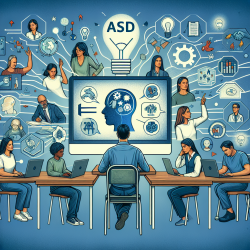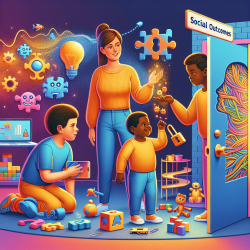Introduction
As a speech-language pathologist, it is crucial to continuously seek innovative approaches that enhance therapy outcomes for children. The recent study, "Learning Circles: A Collaborative Approach to Enhance Local, Healthy and Traditional Foods for Youth in the Northerly Community of Hazelton/Upper Skeena, British Columbia, Canada," offers valuable insights that can be applied to our field. This initiative, focused on engaging Indigenous communities in enhancing access to local and traditional foods, provides a model for fostering collaboration and cultural integration in therapeutic settings.
Understanding the Learning Circles Approach
The Learning Circles (LC) initiative is a community-based participatory research (CBPR) approach that emphasizes collaboration between researchers and community members. It aims to enhance holistic health by integrating local and traditional food systems within Indigenous school communities. This model, adaptable to various contexts, highlights the importance of partnership-building, cultural respect, and community engagement.
Key Outcomes and Their Relevance to Speech-Language Pathology
The LC initiative's success in Hazelton/Upper Skeena was marked by several key outcomes:
- Partnership Building: The initiative fostered strong partnerships between schools, local organizations, and community members, which is essential in creating a supportive environment for children receiving speech-language therapy.
- Cultural Integration: Emphasizing traditional knowledge and practices, the LC model respects cultural diversity, which can be mirrored in therapy by incorporating culturally relevant materials and activities.
- Community Engagement: Engaging the broader community in the initiative ensured sustained support and resources, a principle that can be applied to involve families and communities in the therapeutic process.
Implementing LC Principles in Speech-Language Pathology
Speech-language pathologists can draw from the LC model to enhance their practice in several ways:
- Collaborative Partnerships: Build partnerships with local schools, community organizations, and families to create a network of support for children receiving therapy.
- Cultural Competence: Incorporate culturally relevant materials and activities into therapy sessions, respecting and valuing the cultural backgrounds of the children and families served.
- Community Involvement: Engage families and community members in the therapeutic process, encouraging their participation and input in setting goals and activities.
Encouraging Further Research
While the LC initiative provides a promising model, further research is needed to explore its application in speech-language pathology. Practitioners are encouraged to engage in research that examines the impact of culturally integrated approaches on therapy outcomes, contributing to the growing body of evidence supporting data-driven, culturally competent practices.
To read the original research paper, please follow this link: Learning Circles: A Collaborative Approach to Enhance Local, Healthy and Traditional Foods for Youth in the Northerly Community of Hazelton/Upper Skeena, British Columbia, Canada.










